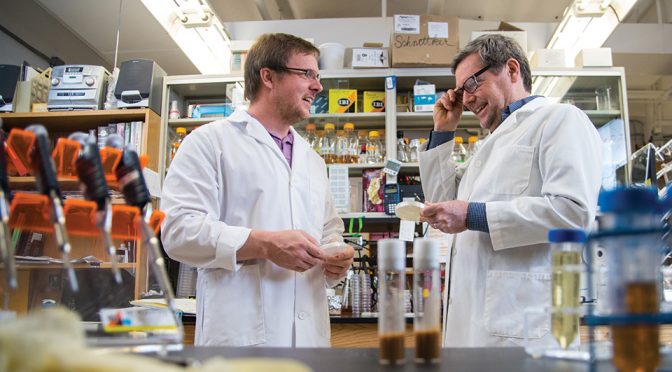Leonard Dobens, Ph.D., is not afraid to admit he spends much of his time with flies. Instead, he sees the beauty and importance of studying these tiny organisms.
Dobens is currently researching the role of a gene called Tribbles
in embryonic development and diseases. He uses Drosophila melanogaster, more commonly known as the fruit fly, as a model system. Dobens’ work focuses on analyzing the common features of the Tribbles proteins that are shared by all animals, including humans, and are important for their activity and during development. He has found that the fruit fly is a great place to begin to understand the basic ways in which Tribbles functions.
“The fly is a ‘fruitful’ place for both testing structure and function
and sorting out genetic pathways,” Dobens says. “The fly uses insulin to control its metabolism, and we can manipulate gene function very easily using powerful genetic tools to determine the effect of Tribbles on cell growth and cell division. We’ve uncovered some interesting new findings.”
Among those findings, the Tribbles gene was implicated in insulin signaling, meaning it is upregulated in exercising or starving animals and dials down insulin release in peripheral tissue.
“The implications of that are enormous — it is the ‘skinny gene’
that, when turned on, blocks fat formation,” Dobens says.
Additionally, Dobens and his team are currently doing genetic screens to find new genes that will work with Tribbles in its cellular functions. In humans, the Tribbles gene has been connected to defects in metabolism, and the fruit fly has shown promise in the testing of compounds for various diseases.
“Demonstrating that the Tribbles gene regulates insulin signaling in the fly has opened up the field to better understand its connection to metabolic disease and cancer,” Dobens says. “More recently, we showed that a human Tribbles variant associated with Type 2 diabetes has the same function in the fly, building on our original finding.”
The effects of this research could change lives. Dobens hopes fly
Tribbles can serve to test small molecules and eventually develop drugs to alleviate insulin resistance in diabetic patients and block insulindependent tumors in cancer patients. And all this began with his work as a biology and pre-med major cleaning dishes in a Boston College lab.
“After four years of washing dirty fly vials — or despite this — I became interested in Drosophila research,” Dobens says. “To choose the fruit fly as a model was such a lucky choice. It has proven an unrivalled model to understand how genes work together to build cells, tissues and whole organisms. Now that genomes are completely sequenced and all the genes in an organism are known, the next great challenge will be explaining how those genes work together to build an animal. The fly offers a chance to accomplish this in my lifetime!”
Dobens, while successful in his own right, knows he can only accomplish these great feats with a strong team of bright, hard-working students by his side, so he applies that same passion to mentoring students. He believes in paying forward what his mentors from Boston College, Harvard Medical School and others in his long career in academia have bestowed upon him.
“My mentors over the years showed enormous patience with me and welcomed me into their labs, which were exciting and warm places to grow as a scientist,” Dobens says. “They were generous in their time, impressive in their knowledge of the subject, and interesting in the ways that they thought about science,” he says. “They led by example. I have strived do science with a human face, as they all did.”
Dobens says his mentors created an atmosphere unlike any he had experienced before. They made learning fun and dynamic, and sought to infuse the latest findings into teaching, all of which he admires and tries to replicate in his classes at UMKC. He believes in drawing upon his students’ and colleagues’ diverse skills to attack a problem from a variety of angles.
“The students at UMKC often bring a level of maturity and training that has a lot of relevance to working in a lab,” Dobens says. “Multitasking when waiting tables is exactly what running three experiments at once is like!”
There is no denying his work with students, both inside and outside his classroom and labs, has paid off. Past students he has mentored have performed and presented groundbreaking research in hormone therapies, won local and national awards in science and engineering fairs, and earned the first and only prestigious National Science Foundation graduate fellowship in the history of the UMKC School of Biological Sciences.
Meanwhile, Dobens’ own research with Tribbles could potentially change the methods health-care providers use to treat prevalent, chronic diseases and the ways in which people who live with them cope — and it all started with a fly.
Whether it’s the diminutive animals he studies in his lab or the detailed guidance he offers his students, Dobens has proven the smallest things in life can have the biggest impact.

